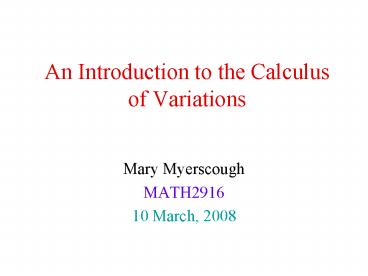An Introduction to the Calculus of Variations - PowerPoint PPT Presentation
1 / 18
Title:
An Introduction to the Calculus of Variations
Description:
The function f (x) is a single valued, continuous. function where ... Example 2: The catenary; a problem in statics. y. x. a. b. What shape does the chain make? ... – PowerPoint PPT presentation
Number of Views:1714
Avg rating:3.0/5.0
Title: An Introduction to the Calculus of Variations
1
An Introduction to the Calculus of Variations
- Mary Myerscough
- MATH2916
- 10 March, 2008
2
The Archetypal Problem
yf(x)
Find the function y f(x) which minimises (or
maximises) the integral
y
x
a
b
3
But why is this important?
Historical development of calculus
Johann Bernoulli
Many important applications
Of intrinsic mathematical interest
4
Fundamental idea
Calculus of variations finding the function f
(x) with domain a,b that gives the minimum or
maximum value of a integral
The function f (x) is a single valued, continuous
function where f (x) exists and I is defined
on a,b.
5
Fundamental idea
We usually write
where y f(x).
6
Fundamental idea
We usually write
where y f(x).
I is a functional. Its input is a function. Its
output is a number.
7
Fundamental idea
To find y f(x) such that
has a minimum or a maximum, we solve Eulers
equation
The solution to this equation is called an
extremal.
8
Where do these integrals arise?
Example 1 find the shortest distance between two
points.
Let the points be (a,f(a)) and (b,f(b)). We
minimise
element of arc length
so
Element of arc length is given by
F(x,y,y)F(y)
9
Such curves are known as geodesics.
On the plane, geodesics are straight lines.
On the sphere
on a torus
On other shapes
All images from www.elesoft.com/geodes.htm
10
Example 2 The catenary a problem in statics
y
heavy chain
x
0
ds
peg
y
b
a
What shape does the chain make?
11
Potential energy of an element of the chain (m
ds)gy mgy ds
So we minimise total potential energy
Substituting
we get
F(y,y)
12
Example 3 The brachistochrone a problem in
dynamics
y
bead
a
b
x
0
frictionless wire
What shape of wire allows the bead to travel
from xa to xb in the shortest possible time?
13
Time to travel from a to b
Now so . Also,
Substituting these expressions and writing ds in
terms of y and dx
F(y,y)
14
Example 4 Principle of Least Action (Hamiltons
Principle)
The path of a dynamical system from one
configuration at time t1 to another at t2 makes
the following integral stationary.
kinetic energy of the system
potential energy of the system
Hamiltonian mechanics (MATH3977)
15
Example 5. Tree growth
How much of its resources should a tree give to
reproduction so as to produce most offspring over
its life span?
Let y(a) be the proportion of resources allocated
to growth. So 1-y(a) is the proportion allocated
to reproduction.
We want to maximise
proportion of trees that survive to age a
proportion of resources actually available for
growth
fecundity of trees age a
Adapted from http//www.math.utah.edu/hills/ez_co
v/node4.html
16
Questions to think about.
What if the extremal yf(x) is not smooth?
Where does the Euler equation come from?
Can we test to see if I is a minimum or a
maximum? If so, how reliable is the test?
Can we apply calculus of variations to functions
of two variables?
What happens if the endpoints are not fixed?
17
Giving a mathematical talk
Remember that you are communicating differently
from written work.
Remember that you are communicating visually as
well as aurally.
Be thoughtful and creative. Dont just read your
essay or regurgitate what youve read.
PRACTISE!!
18
Choices for writing mathematics
Microsoft programs PowerPoint, Word. Easy to
use.
TeX and LaTeX programs Steep learning curve
but beautiful maths easily produced
Others Licce???
For talks Overhead projector, white board































